At their meeting yesterday, the finance ministers of the euro area countries wanted to agree on three key reforms to deepen the economic and monetary union: a separate budgetary instrument for the euro area, the fiscal backstop for the Single Resolution Fund (SRF) provided by the European Stability Mechanism (ESM) and progress towards a European deposit insurance scheme (EDIS). After tough negotiations, the meeting did not end until the early hours of this morning. The finance ministers were able to agree on the fiscal backstop by the ESM. They also agreed on including the decision on expenditures of the eurozone budget in the discussions on the EU’s multiannual financial framework. This gives the European Parliament a say on spending. However, only key points were adopted while many important details could not be sorted out. It remains unclear how the eurozone budget will be financed and what its size will be. Most recently there were reports of only 17 billion euros stretched over 7 years – a fraction of the 5% of GDP of the euro zone previously demanded by French President Emmanuel Macron. The budget is meant to finance both investments and structural reforms to promote competitiveness. A macroeconomic stabilizing function is not envisaged because of resistance by the German government. Discussions on EDIS or the reinsurance of national deposit guarantee schemes were unsuccessful and are to be continued in the second half of 2019.
MEP Sven Giegold, financial and economic policy spokesperson of the Greens/EFA group commented:
“A great success for the eurozone budget has turned into a small step. The decision of the finance ministers is disheartened. The German Federal Government has sabotaged the project through hesitation and procrastination. Germany has robbed the original Macron plans of their ambitions. The contribution to economic convergengence and European solidarity of the Eurobudget will be marginal. Also the French government contributed to the poor result by insisting that any contribution to the Eurobudget should result to roughly equal spending in the contributing state. Seven years of negotiations to reform the eurozone ended with poor results. A eurozone budget can only live up to its name if it stabilizes the economy and invests in times of crisis. Without a budget of a relevant size, there is a real threat that the next crisis will again lead to austerity budgets such as those recently seen in Portugal and Greece. The unemployed, low-income earners and pensioners will suffer the most. The finance ministers should use the remaining time to better fund the budget than currently planned.”
Photo: ©European Union

